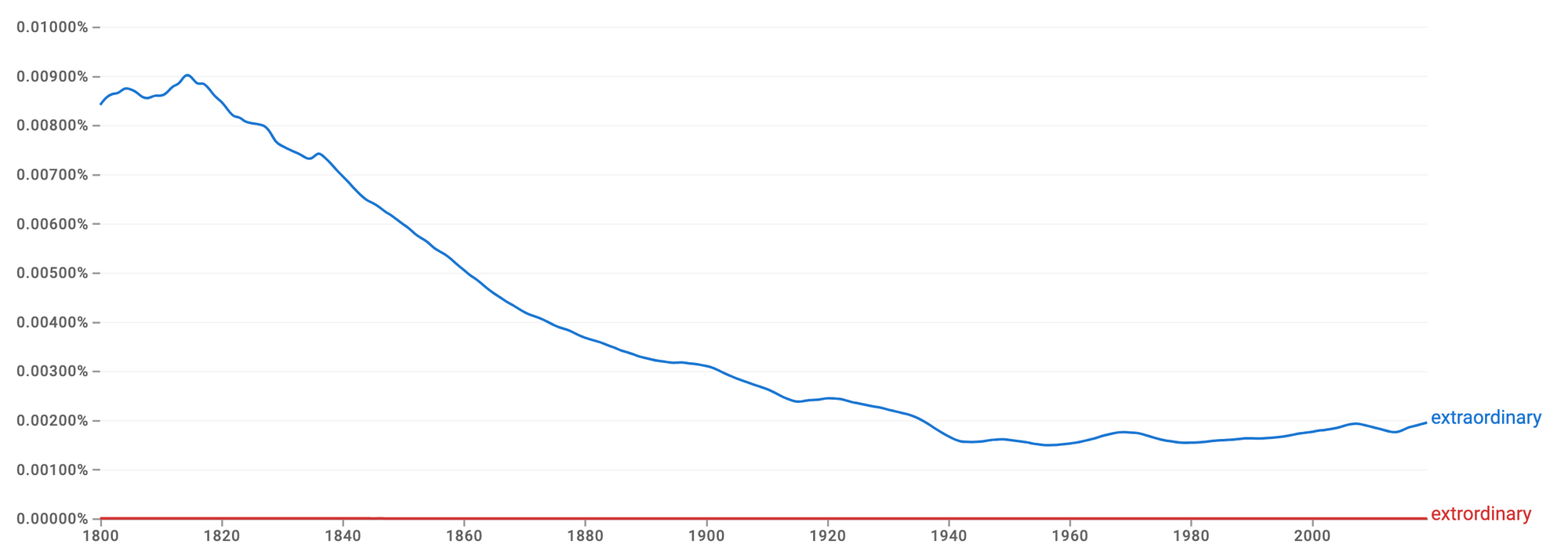- "Extrordinary" is an incorrect spelling of the word "extraordinary."
- "Extraordinary" is used to describe something that is remarkable, exceptional, or surpasses the ordinary or usual.

❌ The performance of the acrobats was truly extrordinary, leaving the audience in awe with their breathtaking stunts.
✅ The performance of the acrobats was truly extraordinary, leaving the audience in awe with their breathtaking stunts.
In this context, "extraordinary" means exceptional or remarkable, describing the remarkable nature of the acrobats' performance.
What does "extraordinary" mean?
"Extraordinary" denotes something that significantly exceeds the ordinary, commonplace, or expected. It signifies elements or experiences that possess exceptional qualities, eliciting feelings of wonder, awe, or admiration. Understanding its etymology and nuances empowers accurate application in diverse contexts.
Etymology: "Extraordinary" stems from the Latin terms "extra" (meaning "beyond") and "ordinarius" (meaning "ordinary"). This combination highlights its core meaning: going beyond the usual or typical.
The term "extraordinary" finds application in various domains, emphasizing exceptional qualities:
- Science and Research: To describe groundbreaking discoveries, innovative inventions, or phenomena that defy existing scientific understanding.
- Art and Literature: To analyze works of exceptional beauty, skill, or emotional impact that transcend the ordinary and leave lasting impressions.
- History and Archaeology: To depict remarkable historical events, cultural artifacts, or archaeological finds that offer unique insights into the past.
- Travel and Exploration: To describe breathtaking landscapes, unique cultural experiences, or extraordinary encounters with nature that broaden our perspectives.

The use of "extrordinary" and "extraordinary" over time
The Ngram graph below shows how often "extrordinary" and "extraordinary" have been used from the 1800s to the 2000s. "Extraordinary" still sees steady use despite seeing a decline from the 1820s to the 1940s, while its misspelling "extrordinary" has always seen nearly zero use.


How to pronounce "extraordinary"
In British English, "extraordinary" is pronounced like "uhk·straw·duhn·ree".
In American English, "extraordinary" is pronounced like "uhk·stror·duh·neh·ree".
This is just the standard pronunciation, and there may be slight variations depending on regional accents and individual speech patterns.
Why would we misspell "extraordinary" as "extrordinary"?
1. Typo: "Extrordinary" is essentially "extraordinary" with a missing "a", which means someone could accidentally skip a letter while writing. This is especially common when typing quickly or not focusing closely on the spelling.
2. Phonetic confusion: The pronunciation of "extraordinary" may lead someone to think there's no need for the "a," as the sound can be perceived as "extrordinary."
Other common misspellings of "extraordinary"
- Extrordinary
- Extraordinery
- Extraordinay
- Extrodinary
- Extraodinary
Example sentences of the misspelling of "extraordinary" as "extrordinary"
- "Extrordinary" is not a recognized word; the correct spelling is "extraordinary."
- It's crucial to avoid the misspelling "extrordinary" and use the proper term, "extraordinary."
- Using "extrordinary" in formal writing would be considered a spelling mistake; the correct form is "extraordinary."
- Don't be misled by the misspelling "extrordinary"; always use the correct spelling, "extraordinary."
- The adjective for something exceptional or remarkable is "extraordinary," not "extrordinary."
Example sentences of "extraordinary"
- The scientist made an extraordinary discovery that revolutionized the field.
- Despite facing numerous challenges, she displayed extraordinary resilience and determination.
- The sunset over the ocean was an extraordinary display of vibrant colors.
- The team's extraordinary effort led them to victory against all odds.
- The art exhibition showcased the extraordinary talent of emerging artists.
- His kindness and generosity were truly extraordinary, leaving a lasting impact on everyone he met.
- The historical monument stands as a testament to the extraordinary achievements of our ancestors.
- The performance of the orchestra was nothing short of extraordinary, captivating the entire audience.
- The astronauts shared their extraordinary experiences during the space mission.
- The novel tells the extraordinary story of a young adventurer on a quest for knowledge.
🖊️ Boarder vs. Border: Navigating the Intricacies of These Homophonic Terms
🖊️ Extream or Extreme: Which Is Correct?
Synonyms for "extraordinary"
- Remarkable
- Exceptional
- Outstanding
- Unprecedented
- Phenomenal

Want to sound like a native speaker?
Engram’s AI-powered grammar checker makes your English sound like a native speaker’s, suggesting natural English expressions on top of fixing grammar, spelling, punctuation, word order, and vocabulary.

References:















